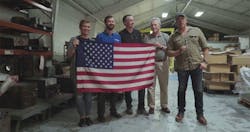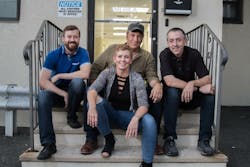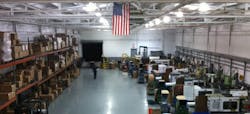Pen Pals: Mike Rowe and Family-Run Pen Maker Partner to Help the Trades
Last year, China finally solved the conundrum of making a decent ballpoint pen. Having lacked the precision manufacturing expertise and quality steel needed for the job, there wasn't much the world's largest exporter could do but import the stainless-steel balls from Japan.
Meanwhile in Garwood, N.J., the Shea family has been continuously mass-producing ballpoint pens since Mao Zedong first took power. Their business—now called the Pen Company of America (PCA) —has made more than one billion writing utensils and now stands alone as the last major pen manufacturer in the country.
"We're a US manufacturer who's fought a very hard fight, and it hasn’t always been pretty, to stay domestic when everybody else went overseas," says Greg Shea, PCA's operations manager, because "it was the right thing to do."
Greg, a former counter-terrorism analyst who spent time in Afghanistan, rejoined the family business in 2010 when it was Rotary Pen. That company was formed by his grandfather, Army Air Corps veteran Warren Shea, along with some great uncles, in 1954. Thirty years earlier, his great-grandfather John Shea was making fountain pen tips in a Manhattan factory. Greg's father Warren Jr.—who goes by Hap (after Hap Arnold,a famed WWII-era five-star general)— picked up the mantle and still works at the Garwood facility. Greg's brother Matt, a former lawyer, runs the business side and older sister Colleen, once a professional tap dancer, left her dance company to sashay around the sales side.
In 2011, Rotuba Extruders, another family-owned business, purchased Rotary and created PCA to keep production stateside. Not wanting to mess up a good thing, they kept House Shea to run the 39,000-ft² factory in., where the plastic injection molding, assembly, and packaging are all done by the 65+ employees. They make 750,000 pens and markers per week for almost 40 million a year, supplying the government, medical, and promotional sectors.
They don’t produce every component in house, but ever piece, including the writing cartridges, come from U.S. suppliers.
Staying American is great for marketing, but challenging in terms of cost and overhead, Greg says. That's alleviated by staying innovative. First, PCA developed the patented Foldzflat pen line, which crumple to fit in a pocket or wallet's credit card slot. Last year, the company released the RevMark Industrial Marker specifically made for the of millions of plumbers, electricians, welders, and HVAC workers. The sturdy marker easily clips upside down onto a belt or pocket and writes on all the tough materials found on a construction site or industrial operation from PVC to cinder blocks
Write Stuff
With little in the Shea family's favor aside from experience and grit, Greg used his analytical mind to identify the one all-American weapon PCA could use to separate its new trades-friendly marker from competitors: Mike Rowe. The eloquent reality show host and manufacturing advocate—formerly of Dirty Jobs and currently of Somebody's Gotta Do It and Returning the Favor —speaks to tradespeople in a way few, if any, can. He also has a foundation, mikeroweWorks, that gives out scholarships to people seeking a career in the trades.
Read IndustryWeek's Interview with Mike Rowe about the Skills Gap
Greg contacted Rowe in 2016 in hopes they could work out a partnership.
Rowe, previously a pitchman for Ford, knew a straight-up endorsement with a smaller company wouldn’t work, but there was another angle.
"We did a [Dirty Jobs] special once years ago called 'Dirty DNA,' where we look at 'dirty jobbers' who were running companies two, three, and four generations down," Rowe says. "And for what it's worth, it was the highest rated specials that we did. So I've always thought there was a lot of goodwill bottled up toward families who are still actually making things here and making a go of it."
At the time, Rowe's new podcast, The Way I Heard It, was small but had potential. PCA sponsored the podcast, in which Rowe would talk more about the Shea family than the actual product. In return, PCA produced RevMark markers with the mikeroweWorks logo emblazoned on the side.
It worked.
"I don't even know what the orders were, but in my little world with 5 million people on a Facebook page, we were overwhelmed with questions and support for this family," Rowe says.
Shea says any time Rowe mentions PCA, there are still "huge spikes" in sales.
America's Next Chapter
Aside from selling industrial markers, this partnership between a fourth-generation pen making family and working-class hero spotlights the serious issues facing manufacturing. Rowe avidly talks about how the current skills gap is a byproduct of foolishly pushing kids into four-year degrees they spend their lives paying off, while plenty of great, high-paying trade jobs exist if you're willing to put in the effort.
"From a purely foundational perspective, and just from traveling around for the last 20 years and talking to employers, there's no bigger issue," Rowe says.
In Garwood, Greg Shea sees that firsthand, trying to hire new employees.
"For injection molding, it's near impossible to find people who have experience," he says. "Both for mechanics who do upkeep and foremen who know how to get parts running well." He says two out of three foremen are homegrown.
That's time-consuming and costly.
"You have to bring in somebody and teach them from the ground up how to handle these machines and run them," Greg says.
But that's actually worked out for PCA, Greg says: "My plant manager who runs the entire molding side of our business started out as an operator taking parts out of machine."
The plant manager's mother worked there and he started right out of high school making entry-level money. Now a little more than a decade later, he makes upper-management money with zero student loan debt. PCA paid for his continuing education.
"Everything we threw at him, he never complained and worked hard, so [he] moved up ranks," Greg says. "He's in charge of a large percentage of a multi-million-dollar operation. I truly believe if he'd gone to college, he wouldn’t be in the position he is now."
This is the scenario Rowe evangelizes through his humble multimedia empire, and ultimately why he decided to spend time visiting the Sheas and making several videos with them.
"So we have the Pen Company of America, who, on a microcosmic level, is dealing with the exact same challenges of recruiting as Caterpillar and some of the biggest bellwethers in the country," Rowe says.
Spotlighting how this one family has stuck together to manufacture success even in dark times should give the rest of the industry at least a glimmer of hope.
"I just love the idea of something as simple as a pen," Rowe says. "I've always argued that if you can't make a pen here, what hope does Detroit have?"
About the Author
John Hitch
Senior Editor
John Hitch writes about the latest manufacturing trends and emerging technologies, including but not limited to: Robotics, the Industrial Internet of Things, 3D Printing, and Artificial Intelligence. He is a veteran of the United States Navy and former magazine freelancer based in Cleveland, Ohio.
Questions or comments may be directed to: [email protected]




